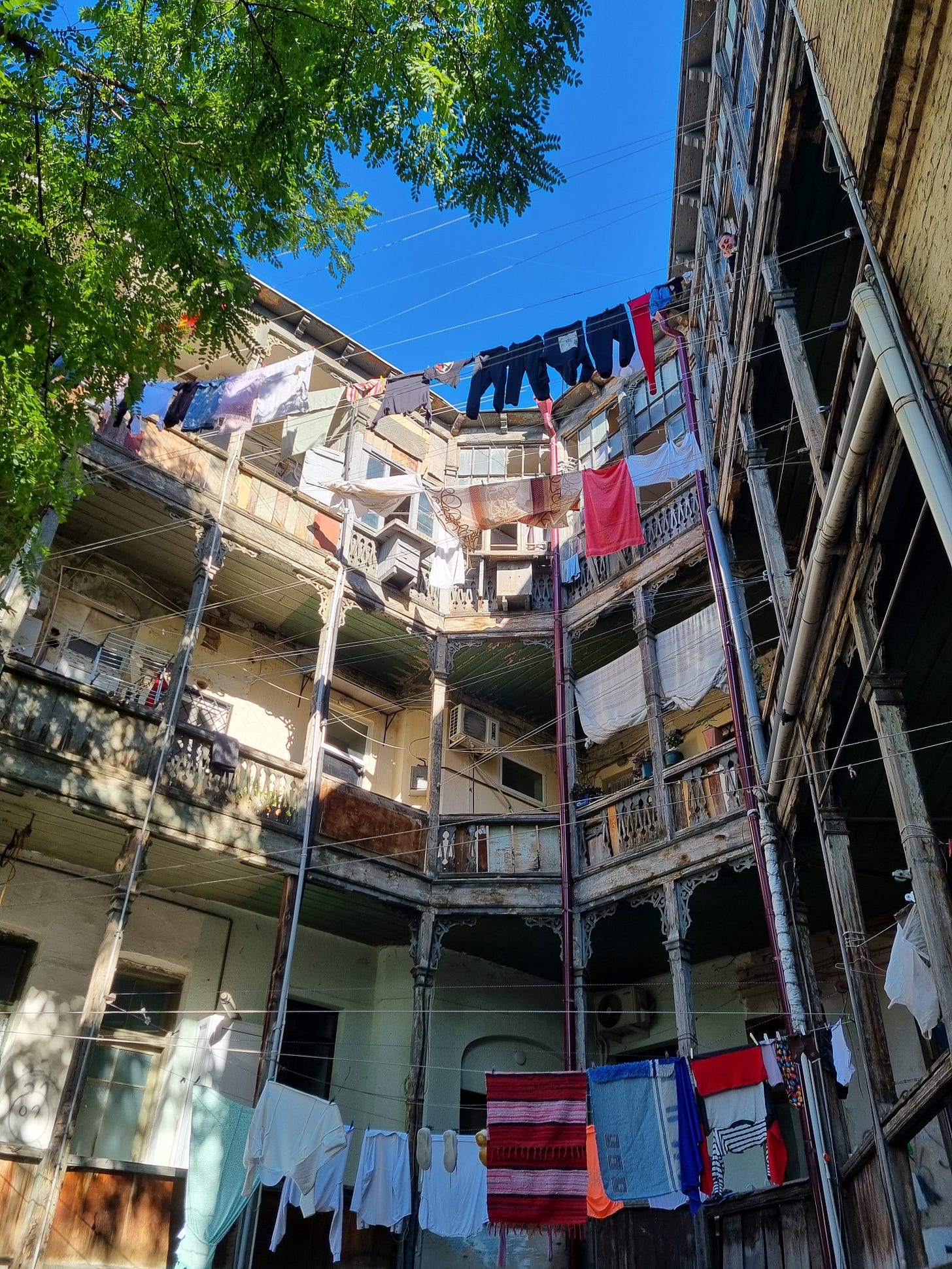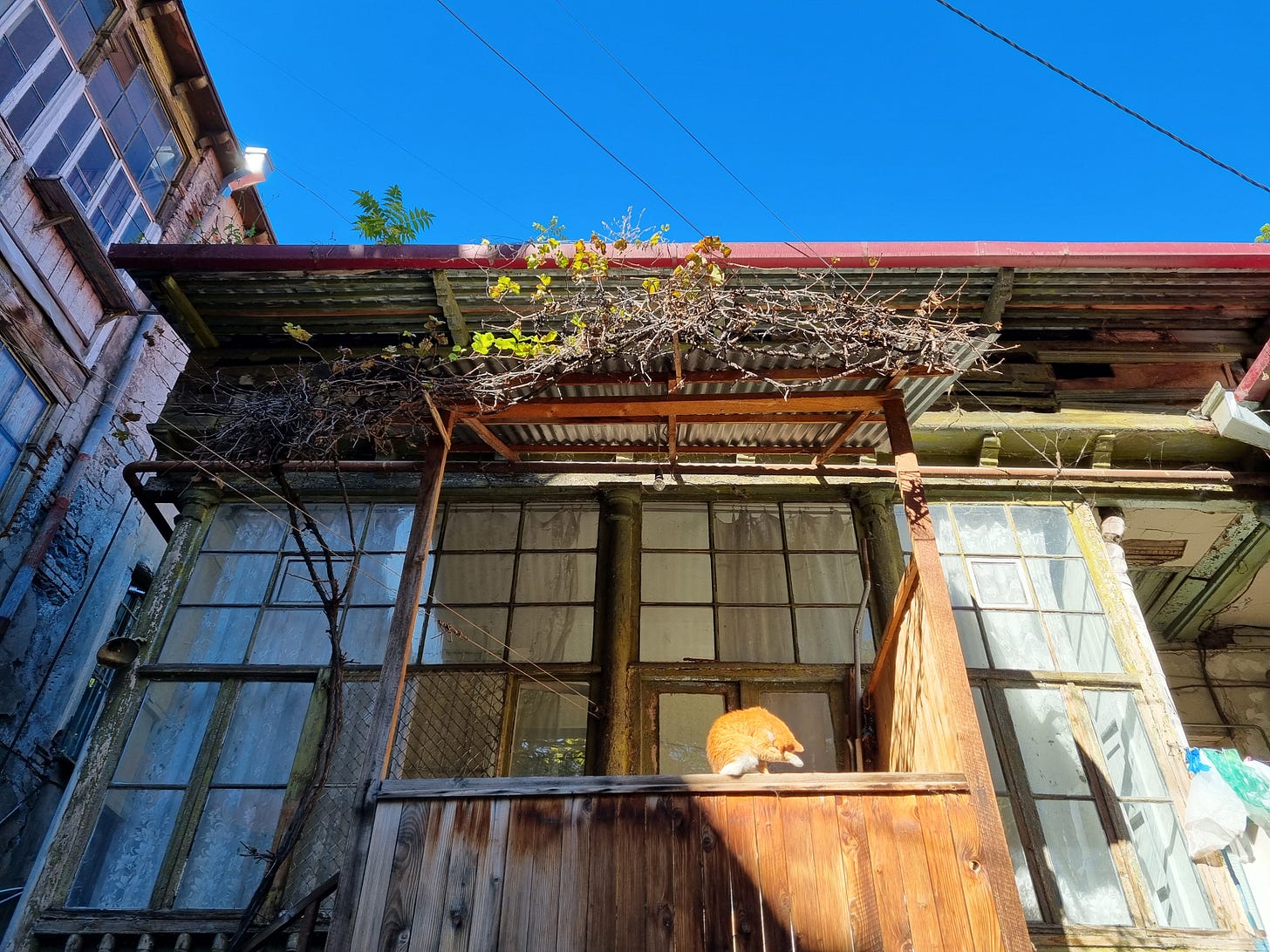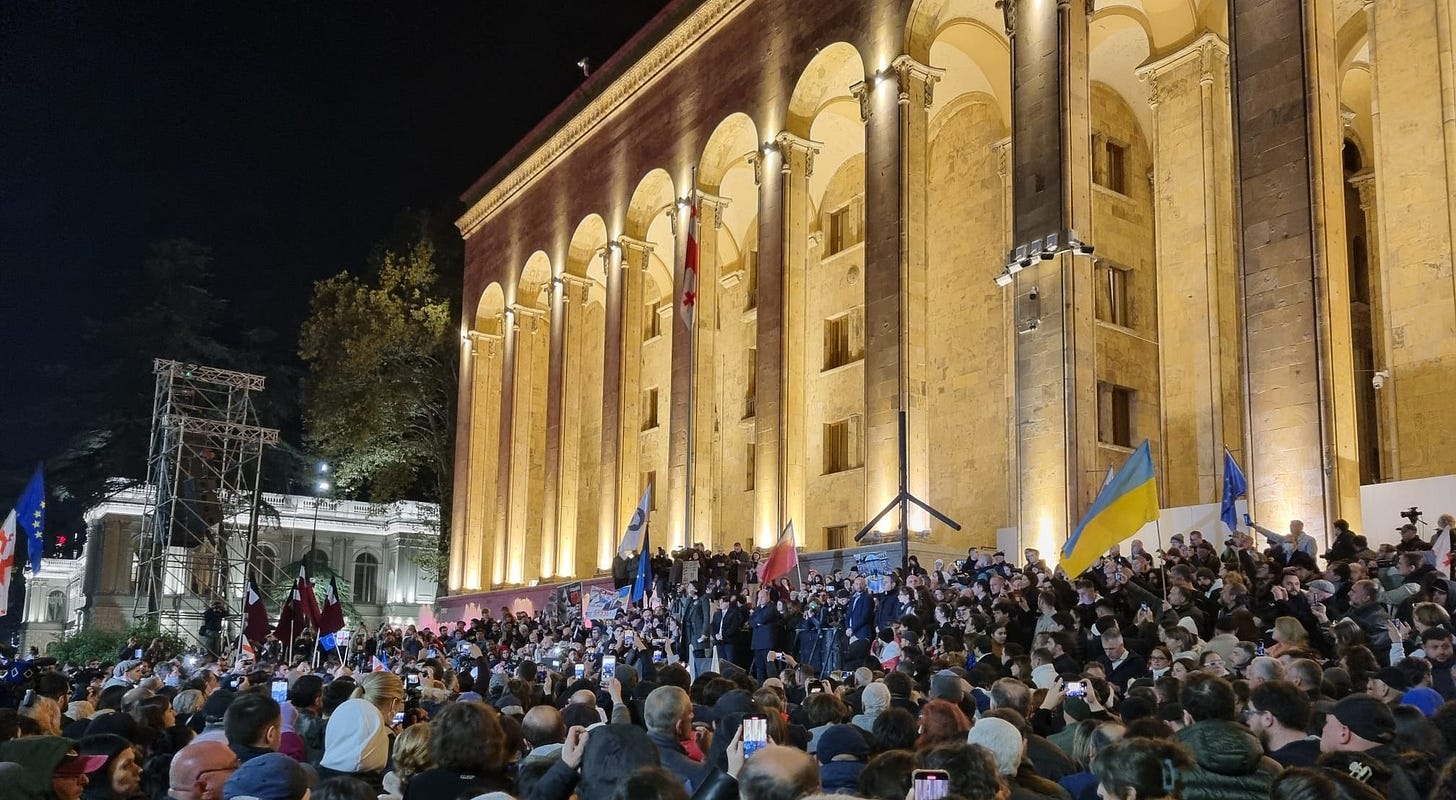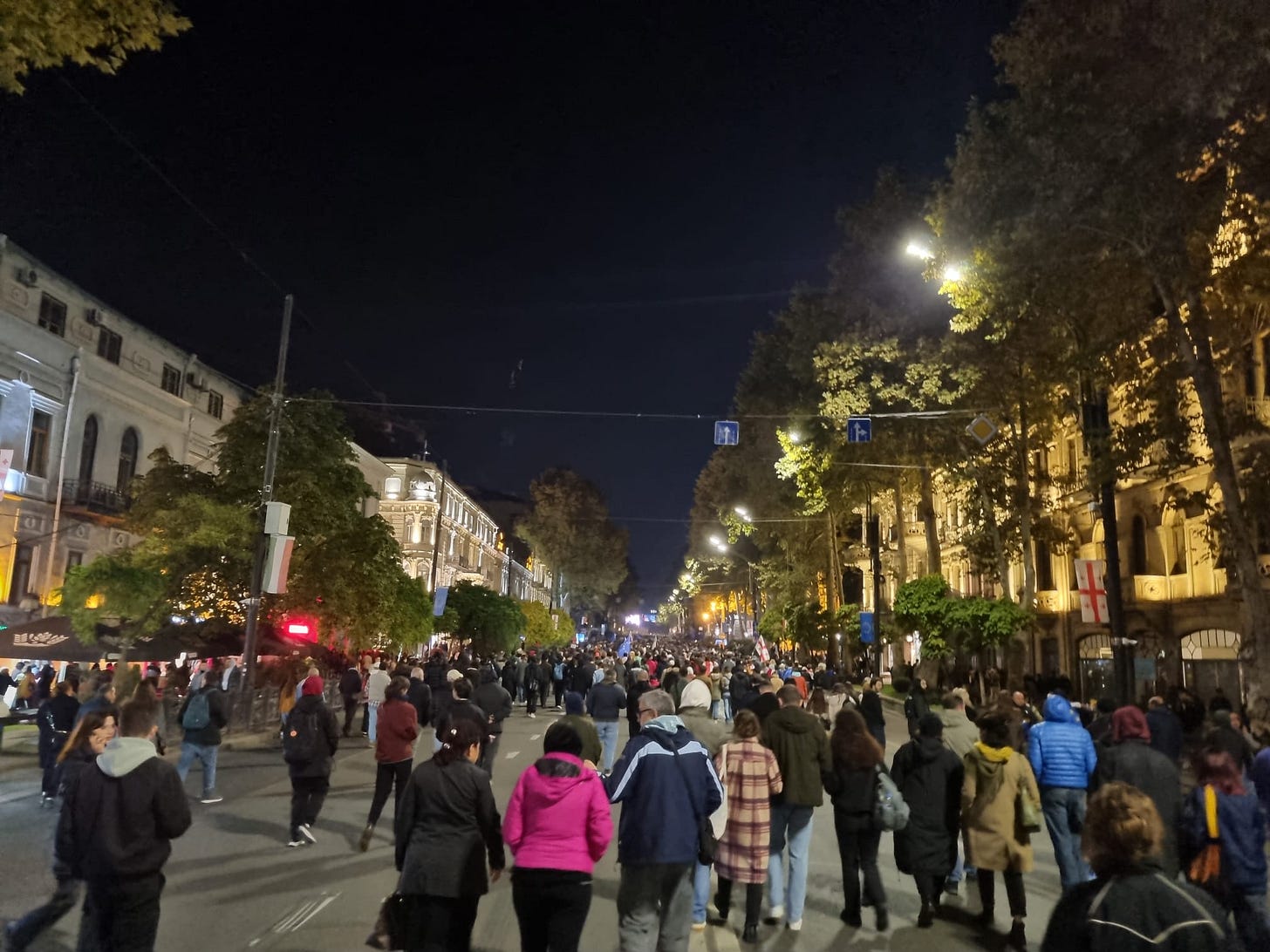Russian influence, election monitoring, election meddling, Foreign Interference, propaganda, disinformation, European policy, Transparency, democracy… In the world of OSINT and Disinformation, we are using all these words in every report, study, research, briefing or LinkedIn posts. But in Georgia, it was really happening, with real people, all of this and all at once. It would happen not on the internet, not on networks, not AI or Twitter, but on billboards in the streets, in physical polling stations, in a real parliament, in demonstrations.
So, we went to spend two weeks in Tbilisi, one before the elections, one after. This is a subjective view, in multi-episodes, of what I saw and understood.
This is a tale about European style democracy fighting Russian style authoritarianism, in a small country at the crossroad of four continents.
Thanks, Eva Bauchau, for context, expertise, contacts and on-site support.
(This is episode 5, previous episode here)
54%. It had climbed up during the night.
Interactive map was showing scores touching 72%, 76% or 87% in some regions. In voting stations abroad, Georgian Dream was not above 15%.
Hangover and depression.
The opposition had announced they would not recognise the election. They were trying to unite, especially thanks to the president Zourabichvili. Yesterday she had acknowledged the victory of the opposition at 8pm. Her tweets were still the last one on her newsfeed this morning.
Nobody had yet called for a demonstration. It was more shock and stupefaction.
A nice sunny day though.
And a guided walking tour.
The guide, a fascinating and passionate hipster, captivated my attention while I was depressing in the Hostel lobby so I decided it would be the best thing to do today.
He narrates the innumerable foreign influences that shaped the city. The German quarter, whose church did not survive communism, but who still managed to leave the root of the Georgian word for potato. The laundry drying on windows that are said “Italian style” despite being pure Georgian tradition, only as a tribute to Italian movies.
Soviet art also. They kept it firstly because they love art, and because it was the sign of liberalization, after Stalin who was killing the artists only for having coloured things in violet, and who was pushing the poets to suicide.
“Stalin was Georgian, no?”
“Sadly” answers the guide.
This country is mistreated by its own children when they grow Russian it seems.

He shows us the buildings of Persian architecture but built by western architects, because they were finding eastern more beautiful; and the buildings of western neo-gothic architecture, built by local architects who were finding western style more attractive. This city is a collection of foreign influences.
Up to that recent building, inspired by traditional balcony decorations and by the opening credit of Game of Thrones.
“Can you explain the elections?” A tourist (not me), have asked the question. The guide does his best to sum up the dive into the abyss.
“A year from now, maybe I will be an immigrant in your country. Or maybe I will be in prison…”
All and every opposition parties were rejecting the election result. “Elected” MPs announced they would refuse to sit in the Parliament, and the president was calling for a huge demonstration as a show of force.
“How are you doing today?” had I asked to a friend. “Getting ready for tomorrow’s protest again, how are you?”
Definitely, it was the women who would do the revolution, whatever the country I would go.
Demonstration Day
Of course, people are not more available this week than they were last week before the elections.
Everybody had told me “Yes, but this week will be overbooked, because of the elections, but next week we shall find a slot for an interview”. And this week, actually, Georgian Dream had won, the entire opposition led by the President was united to reject this government, no one knew what would happen, all Europe was denouncing the vote manipulation and the rigging of the elections without exactly knowing how it was rigged (and being badly screwed because Europe had followed the opposition who had decided to play the game despite the rigging).
Well, “all Europe”, not exactly. Viktor Orban, the rotating president of Europe, had just landed in Georgia to start an official visit to congratulate Georgian Dream victory and to support its government.
Obviously, everybody was in frenzy and panicking over the unknown, and all professional contacts, families, friends and colleagues were asking “what is happening?” and one could just answer “nobody has a clue”.
In retrospect I came to think that all people who had told me before the elections “let’s see each other next week” sincerely believed the opposition would win. We all believed it. Collective hallucination that led us all to believe it would be possible to win free and fair against an authoritarian regime in a rigged election, only by the power of civil society and democracy…
This was one of this country civil society’s power. To make you believe that democracy was possible, even against all odds. Democratic hallucination versus Georgian Dream, of course it could have worked. Why could it not?
I walk down Rustaveli street, and the sun has just set. Demonstrations in this country take place at night.
As I walk, the crowd becomes more dense and people seem to join the demonstration from every street around. Some protesters join the main street with flags (Georgian and European) and blowing a whistle (like a mini football horn). A baby in a pushchair pushed by a grandmother is answering to them with the same kind of whistle.
Obviously for this demonstration, they did not block the roads before, they will do it only at 7PM, just at the time the demonstration “officially” starts, not a minute before.
“Hey Antoine!”
My name was just called in the middle of a demonstration in Georgia. I look up.
Tina, Tamar and Georgi, three young and brilliant activists from MDF are here, demonstrating, as I imagine every young brilliant from all Georgia.
“It’s difficult to know how to get rid of an undemocratic government with democratic means”
(Just after saying “hi”, Tina just summed up the whole question of this trip, the elections, and Georgia’s recent past and future in one sentence. I get my notebook out to get some feelings and impressions from them.)
“Mood is really down. We have seen this movie already” …
We all go find a good place on the parliament esplanade. On a surprisingly small stage, right in the middle of everybody, someone warms up the crowd with small speeches in the loudspeakers. “We wait for the president and opposition leaders who will come to tell us how they will protect our vote” (Tina translates to me).
“So, they do have a plan” I ask. Tina bursts out laughing “Oh my God, I hope they have a plan!”
With Tamar and Georgi, they relate me how the previous election was exactly the same story, and the opposition tried to issue an ultimatum that led to nothing. “It is stupid to issue an ultimatum if you have no power and you can’t do nothing when it expires, they just said “no” and the opposition could not do nothing”.
Opposition already tried to refuse to sit in the parliament, but they were pressured to go anyway, to try and limit the damages. (I suspect the European partners to have asked the Georgians to still go to sit in parliament in the sake of “stability” and “the crisis is over”)
President Zourabishvili starts the speech, on the little stage just 50 meters away from us. Georgia is a small country.
They really like her and everything she has done to unite the opposition, but they still laugh on her thick French accent.
Tamar just comes back with us with her very young friends she went to pick up. They talk with a grandmother with a headscarf.
The orators are coming one after the other. All the leaders of the opposition are here. Giorgi Vashadze, from the UNM, the party of former president Saakashvili (that no one likes) is very good speaker.
“No negotiations, no dialogue”. Tina applauds and shouts “thank you!” “Finally, someone says it” she tells me.
I can only concur. “Dialogue with Putin” is usually a keyword meaning the intention of giving to Putin everything he wants, trade democracy for the illusion of peace and call it “realism”.
This is clearly the exact opposite of Georgian Dream rally I went to a few days ago. The average age here is 25-year-old female. Many of them came with their parents or have their parents somewhere in the demonstration.
The former president speaks. “Can you imagine? Georgian Dream had two presidents elected, both are hating them.”
One speaker comes. “She is the closest one to Saakashvili, she is a bit crazy”.
Tamar tells us the grandmother next to us was complaining a bit up until the moment she hears the name “Saakashvili” from one of the speakers. They laugh. “Say whatever you want about the previous government but at least they had the decency to go with elections”. 2012 was the last time Georgia had a peaceful transition of power.
“We don’t really like the opposition, but we have no other choice.”
Right after saying these words, appears on stage the best speaker of the night. Aleko Elisashvili, he is the one who punched the Georgian Dream Majority leader in the parliament when they passed the Russian law. Georgi founds the video on his phone and shows it to me.
“He is the most honest” says Tina to me. “He is saying that we do not have to love each other, we can fight each other tomorrow but today we have to stay unite.”
He is 46 years old, and he went to fight in Ukraine. Just a few months but still more than me.
Orban is just one small hundred meters away from us, at the Marriott hotel. He is abundantly booed.
On the way back, the dispersal still looks like a demonstration because there is so many people. And this time one is allowed to walk on the street.
I take the occasion to salute the olive tree who stands in the middle of the roundabout and that I never had a chance to properly pay tribute to.














